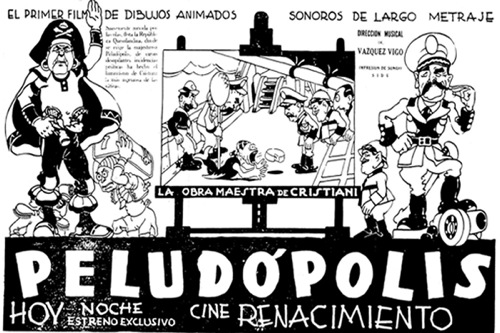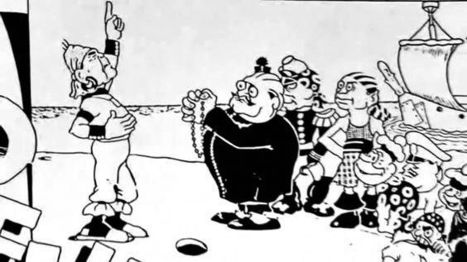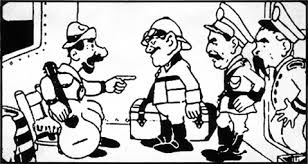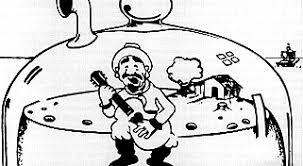Peludopolis (partially found Argentinian animated film; 1931): Difference between revisions
No edit summary |
No edit summary |
||
| (30 intermediate revisions by 15 users not shown) | |||
| Line 1: | Line 1: | ||
{{InfoboxLost | |||
|title=<center>Peludopolis (1931)</center> | |||
|image=Peludopolis-de-quirino-cristiani.jpg | |||
|imagecaption=Argentine advertisement poster for the film. | |||
|status=<span style="color:orange;">'''Partially Found'''</span> | |||
}} | |||
'''''Peludópolis''''' is a 1931 animated film by Italian-born, Argentinian animator and director Quirino Cristiani.<ref>https://www.youtube.com/watch?v=heHnP_JpLhE</ref> Best known for his political satires and his unique animation style, Cristiani made three animated films, all of which are lost (also including ''[[El Apóstol (lost Argentinian first feature animated film; 1917)|El Apóstol]]'' and ''[[Sin Dejar Rastros (lost Argentinian animated film; 1918)|Sin dejar rastros]]''). | |||
The | ==Plot== | ||
The film was a political satire focusing on the then-Argentinian President Hipolito Yrigoyen as he floated around in his boat "Peludo City" (symbolizing Argentina) while being harassed by hungry sharks (representing Radicals). | |||
Still wanting | ==Production== | ||
A year into production for the film, Yrigoyen was ousted by a military coup d'état and production halted. Still wanting his film to see release, Cristiani began de-emphasizing Yrigoyen and the sharks. He added in the generals that overthrew Yrigoyen as the heroes and an everyman character named Juan Pueblo to act as the moral center of the film. ''Peludópolis'' was released on September 16th, 1931, after delay and plot rearrangement.<ref>https://books.google.com/books?id=1JYYAQAAIAAJ</ref> | |||
===Sound=== | |||
''Peludópolis'' is best known as the first animated feature film to be released with sound. Cristiani added this feature partway through production using a second disk to record sound, including multiple songs, to be played alongside the film. This complex system was required to achieve the sound in the film because Argentine cinemas could not yet accommodate sound systems of the time. | |||
In both 1957 and 1961, fires broke out where | ==Loss== | ||
In both 1957 and 1961, fires broke out where Cristiani had stored his films, destroying most of his work. Among the lost materials included the only known prints of ''Peludópolis'', meaning that it is unlikely the film will be seen again. A 1930 documentary, along with several stills and posters, have survived. | |||
== | ==Gallery== | ||
===Surviving Footage=== | |||
{{Video|perrow =2 | |||
|service1 =youtube | |||
|id1 =heHnP_JpLhE | |||
|description1 =A four-minute making-of feature of ''Peludópolis'', made in 1930. | |||
|service2 =youtube | |||
|id2 =PAS7uenh3nc | |||
|description2 =A reconstructed fragment from the film | |||
}} | |||
===Stills=== | |||
<gallery mode=packed heights=175px> | |||
Peludopolis.jpg | |||
Peludopolis2.png | |||
Peludopolis3.png | |||
</gallery> | |||
==References== | |||
{{reflist}} | |||
==External Links== | |||
*https://en.wikipedia.org/wiki/Pelud%C3%B3polis | |||
*https://imdb.com/title/tt0196839/ | |||
[[Category:Lost animation]] | |||
[[Category:Lost films]] | |||
[[Category:Partially found media]] | |||
[[Category:Historic]] | |||
Latest revision as of 20:22, 16 October 2023
Peludópolis is a 1931 animated film by Italian-born, Argentinian animator and director Quirino Cristiani.[1] Best known for his political satires and his unique animation style, Cristiani made three animated films, all of which are lost (also including El Apóstol and Sin dejar rastros).
Plot
The film was a political satire focusing on the then-Argentinian President Hipolito Yrigoyen as he floated around in his boat "Peludo City" (symbolizing Argentina) while being harassed by hungry sharks (representing Radicals).
Production
A year into production for the film, Yrigoyen was ousted by a military coup d'état and production halted. Still wanting his film to see release, Cristiani began de-emphasizing Yrigoyen and the sharks. He added in the generals that overthrew Yrigoyen as the heroes and an everyman character named Juan Pueblo to act as the moral center of the film. Peludópolis was released on September 16th, 1931, after delay and plot rearrangement.[2]
Sound
Peludópolis is best known as the first animated feature film to be released with sound. Cristiani added this feature partway through production using a second disk to record sound, including multiple songs, to be played alongside the film. This complex system was required to achieve the sound in the film because Argentine cinemas could not yet accommodate sound systems of the time.
Loss
In both 1957 and 1961, fires broke out where Cristiani had stored his films, destroying most of his work. Among the lost materials included the only known prints of Peludópolis, meaning that it is unlikely the film will be seen again. A 1930 documentary, along with several stills and posters, have survived.



